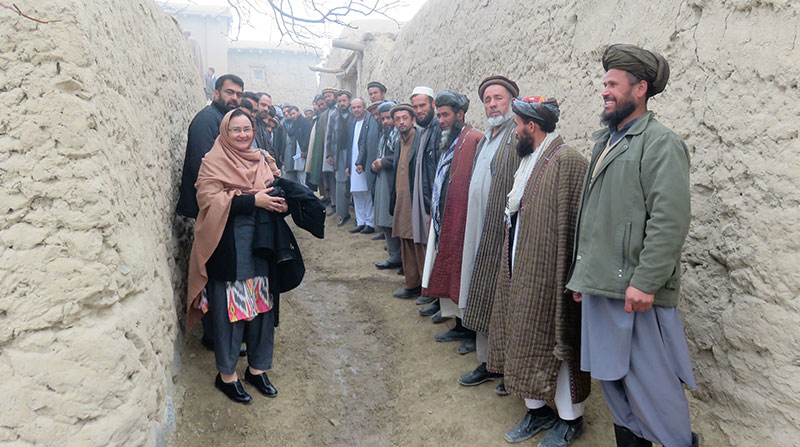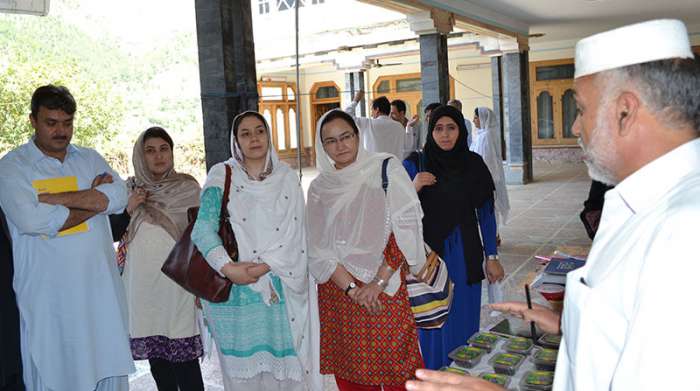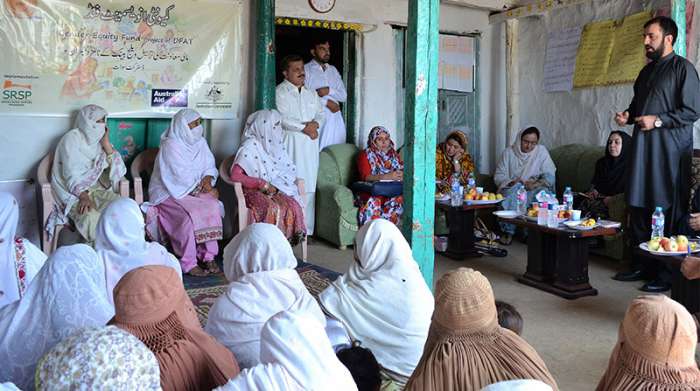

The RSPs’ work is based on the tried and tested principles of social mobilization that have touched the lives of millions of people in other countries of South and Central Asia. Increasingly, the RSP approach to social mobilisation, which entails the clustering of small community organisations, a reliance on community activists and the fostering of strong links with governments, has expanded across the South and Central Asia Region. Through the aegis of the Aga Khan Foundation, lessons from AKRSP in Gilgit were taken to Tajikistan in the 1990s, to be espoused by the Mountain Societies Development Support Programme (MSDSP). In 1994, under UNDP’s South Asia Poverty Alleviation Programmes (SAPAP), the RSP pioneer and now Chairman of RSPN, Shoaib Sultan Khan worked with the UNDP to set up pilots in the region to replicate the RSP approach. In Afghanistan, the National Solidarity Programme (NSP) was built on the principles espoused by Akhtar Hameed Khan and the AKRSP in northern Pakistan.
While the social mobilisation approach has been replicated on a large scale across these Regions, active collaboration between the Pakistan RSPs and others in the Region is also taking place to strengthen and scale up their programmes. Over the past year, RSPN staff has provided consulting services to UNDP Myanmar and the International Fund for Agricultural Development in Tajikistan to strengthen their social mobilisation. RSPN is also engaged with the Bangladesh based organisation, BRAC, in a research project which aims to capture learning’s from scale up efforts across South Asia and do a thorough, real-time documentation of the innovative projects of the RSPs in Pakistan. Other key forms of collaboration have been through experience sharing visits between staff as well as some village activists, who have visited other countries using social mobilisation.
The largest scale replication of the RSP approach is in India. This process started in 1994 with the South Asia Poverty Alleviation Programme in the State of Andhra Pradesh (the Society for Elimination of Rural Poverty – SERP) and has been scaled up nationally. Since 2010, SERP’s approach has been replicated in India through one of the largest poverty reduction programmes in the world via the National Rural Livelihoods Mission (NRLM).

The link between NRLM, SERP and RSPN is strong and we seek to continue to increase this collaboration going forward. RSPN and some RSP staff and activists have also visited Tajikistan in 2009 and 2010, and the first visit to the NSP in Afghanistan took place in late 2012, with NSP and Aga Khan Foundation staff and village activists visiting the RSPs in 2013. Similarly, there is active exchange between MSDSP Tajikistan and RSPN. In January 2014, a ten member team from Tajikistan comprising local government and MSDSP staff visited Pakistan for ten days to see the RSP approach first hand. The Tajik team visited Local Support Organisations in the Punjab and the Khyber Pakhtunkhwa provinces.Social mobilisation is not only a successful approach to reducing poverty; it has potential to be a strong link between Pakistan and its neighbours. Key elements of India’s programme have now been adopted by Pakistan’s RSPs and are funded by the Pakistan government, through the Pakistan Poverty Alleviation Fund (PPAF), provincial governments and other donors.
This process was started after RSP senior management and some Pakistan government officials visited Andhra Pradesh in 2007. On this visit, learning took place ‘in reverse’ as it were. The RSPs adopted key lessons from SERP which assisted them in scaling up their programmes through community activists, federating smaller community organizations into union council level Local Support.
Organisations; increasing the number of women in Community Organisations and adopting a new mode of financial services for the poorest, through Community Investment Funds. More recently, in late 2013, a thirteen member team of women cooperative members and entrepreneurs from Afghanistan visited Pakistan and had an opportunity to meet with community women involved social mobilisation and micro enterprise development.
In Pakistan between 2007 and 2017 the number of organised households as members of community organizations rose from 1.7 million to almost 7.2 million, whereas the ratio of women’s participation rose from about 30% to 51%, having been inspired by SERPs success of working only through village women. A total of over 1,457 LSOs have been formed to date. RSPN is grateful to DFID/UKaid which supported initial pilots in all provinces and areas, in order to replicate SERP successes in Pakistan. Sharing the success that the social mobilisation has had even beyond South and Central Asia, RSPN’s Chairman, Shoaib Sultan Khan visited the United States in June, where he spoke at the Harvard Kennedy School as well as at the International Food Policy Research Institute (IFPRI) on the RSP approach to confronting poverty by harnessing the innate potential of communities.Similarly an eleven member team of

Aga Khan Foundation Afghanistan visited Rural Support Programmes Network and Rural Support Programmes in March 2015 primarily to learn about the three tier structure of Community Organization, Village Organization and Local Support Organization with the view of possibly adapting the approach in Afghanistan. The team met the senior management of RSPN including the Chairman Mr. Shoaib Sultan Khan and the management of RSPs at the head office to learn from their experiences and to gain knowledge about the strategic importance of the approach as a sustainable methodology for building people’s own institutions. The team also visited LSOs at Haripur and Gujar Khan to see the change being brought by the endeavours of the LSOs. The AKF team enjoyed their exposure visit and found it quite interesting with possible adaptation in Afghanistan.

Likewise in January 2015 his Excellency Mr. Janan Mosazai, Afghanistan Ambassador to Pakistan, and Her Excellency Mrs. NurjehanMawani, His Highness the Aga Khan’s Diplomatic Representative to Afghanistan visited RSPN and NRSP. Mr. Shoaib Sultan Khan, Chairman RSPN, Dr. Rashid Bajawa, CEO NRSP and Mr. Khaleel Tetlay, Acting CEO RSPN gave a briefing about the history and milestones achieved by RSPs in Pakistan. The guests also met with the community representatives of LSO CHIRAH in Islamabad Capital Territory.In March 2015, Mr. Khaleel Tetlay, Acting Chief Executive Officer/Chief Operating Officer RSPN was invited by BRAC to participate in the Frugal Innovation Forum: Scaling Sustainability at Dhaka during March 21-26, 2015. Over 150 participants from Bangladesh, India, Great Britain, United States, Myanmar, Kenya, Uganda, and Tanzania took part in the Forum. Participants came from government organisations, civil society organisations, social enterprises, corporate organisations, social equity fund management organisations and academic institutions. The focus on the two-day Forum was learning about social innovations and how these can be scaled up sustainably for impact. ACEO/COO participated in a meeting of 60 key stakeholders at the Prime Minister’s Office in a session on Scaling up Rural Community Mobilisation Models. The session was chaired by Professor Syed Hashemi (BRAC University). ACEO/COO spoke about the Rural Support Programmes in Pakistan and how they have built upon work of Dr. Akhter Hameed Khan and the key principles drawn from the Comilla Project by Mr.Shoaib Sultan Khan (Chairman RSPN). He emphasized that the work and scale up of RSPs in Pakistan is driven by the socio-economic context of the country with a very heavy incidence of poverty and also on the opportunity to support the rural people through the proven social mobilisation approach.
At the end, Professor Hashemi briefly spoke about Dr. Akhter Hameed Khan and his innovative work in Comilla and how that work even today continues to inform the rural development approaches not only in Bangladesh but also in other South Asian countries.
Mr. Shoaib Sultan Khan, Chairman RSPN, is also Advisor to the Board of Trustees of the Rajiv Gandhi Mahila Vikas Pariyojana (RGMVP), a flagship programme of the Rajiv Gandhi Charitable Trust of India.
RGMVP, headed by Ms. Sonia Gandhi, the President of the Indian National Congress, has worked for poverty reduction through women’s empowerment, in Uttar Pradesh, India since 2002. Chairman RSPN has visited RGVMP twice upon the invitation of Mr Rahul Gandhi and met with many women’s Self Help Groups. The RGVMP approach is based on the RSP social mobilisation model which has also been the approach of India’s National Rural Livelihoods Mission, as piloted in Andhra Pradesh by the Society for Elimination of Rural Poverty (SERP), initially a UNDP funded programme with Mr. Shoaib Sultan Khan as Senior Advisor for Rural Development. RGMVP aims to organise poor, rural women into community institutions and promotes their financial inclusion, healthcare, livelihoods enhancement and education, creating links with local Panchayats.
The RGMVP website introduces Mr. Shoaib Sultan Khan as ‘A world renowned expert in rural development and winner of the Ramon Magsaysay Award. His pioneering work in India with the World Bank aided Andhra Pradesh Poverty Reduction Project inspired the setting up of India’s National Rural Livelihood Mission (NRLM)’.
A delegation from Afghanistan’s Ministry of Rural Rehabilitation and Development (MRRD) visited RSPN from August 25 to 30, 2017. The seven-member delegation consisted of the Advisor to the MRRD Minister, Ms. Mariam Wafa, the Head of the Afghanistan Rural Enterprise Development Programme (AREDP), Mr. Rehmatullah Qureshi and other AREDP staff. The team visited the Sarhad Rural Support Programme’s (SRSP) areas in Swat district of Khyber-Pukhtunkhwa province, and National Rural Support Programme’s (NRSP) areas in Tehsil Gujar Khan, District Rawalpindi of Punjab province. At the end of the visits, a debriefing was held with Chairman RSPN Mr. Shoaib Sultan Khan and the Deputy Head of Mission from the Embassy of Afghanistan in Pakistan, Mr. Zardasht Shams. A farewell dinner was hosted by Chairman RSPN for the team on August 29, 2017. The dinner was attended by Mr. Sartaj Aziz, Deputy Chairman of Pakistan’s Planning Commission, Mr. Hazrat Omar Zakhilwal, Special Representative and Ambassador to Pakistan, from the Government of Afghanistan, and Mrs. Munawar Humayun, Chairperson of the Board of the Sarhad Rural Support Programme. The purpose of the visit was to study the RSP social mobilisation approach and to interact with communities, specifically women, who are working on agricultural and other enterprises. The Afghanistan team visited a total of six villages and two Local Support Organisations (LSOs). In Swat, the interaction with village communities was detailed and fruitful due to a common language and common social context. The team was exposed to the multiple institutions that communities had formed in Swat, including business groups of women who had impacted the lives of poor rural women. Visits were done to weavers and shawl makers in Islampur, to villages where vegetable marketing was being done by empowered women farmers, to Business Interest Groups (BIGs) working on honey bee farming, off-season vegetables and fruit processing of red and black persimmons and other dry fruits.
A visit was also conducted to SRSP’s and community work on the hydro-power project in Union Council Bishigram of Tehsil Madian, Swat.
After the Swat visit, the team was taken to Gujar Khan to show them the work of organised communities fostered by NRSP. They visited LSO Jand Mehlu and observed the work under NRSP’s Water, Immunisation, Sanitation and Education (WISE) Programme. Community members also presented about the role of community institutions for improving the living conditions of local people and civic rights, self-help initiatives, linkages with government departments, Android based survey & data reporting mechanism, community investment fund and Azadi Sarmya, microcredit, and initiatives taken under Natural Resource Management (NRM) that included production, provision and processing of quality wheat seeds, canola hybrid seeds, soybean seeds and vegetables’ seeds for kitchen garden.




Mr. Umar Zakhilwal, in his address at the farewell dinner for the team, stressed that collaboration of this nature was critical between the two countries for the benefit of poor communities both in Afghanistan and Pakistan. He said that this interaction must continue and invited the RSPN to Afghanistan.